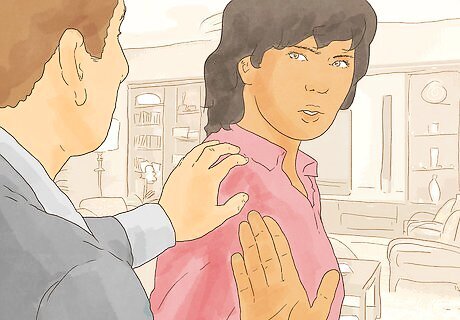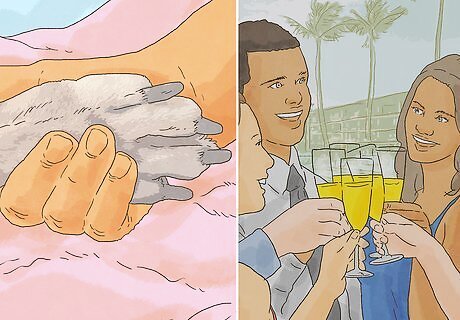
views
X
Expert Source
Michelle Shahbazyan, MS, MALife Coach
Expert Interview. 18 March 2020.
In this article, we’ll walk you through everything you need to know about taking charge and learning to not be a people pleaser.
Get comfortable saying no.

Respect yourself and enforce your personal boundaries. If you tend to always say “yes” to things even when you don’t want to or when situations cause you stress, start saying “no.” Sometimes, people pleasers have a fear of disappointing others that's rooted in insecurity. Remind yourself that you're awesome; people like you for you—not what you can do for them. There’s no need to make excuses or talk your way out of it. A simple “no” or “no thank you” will do. Start small by finding something small to say "no" to and say it firmly. For example, if your partner asks you to walk the dog yet you are exhausted, say, “No. I’d like you to walk the dog tonight, please.” You can also do some role play with a friend to get used to saying “no.” Have your friend ask you to do things, and then respond “no” to each of their requests. Make sure to pay attention to how you feel each time you say “no.”
Assert yourself in a kind, empathetic way.

Express your needs without criticizing or lashing out at others. Some people confusing assertiveness for rudeness, but you can tell people what you need in a nice, supportive way. Show your understanding for the other person and their needs, yet also be firm in saying that you cannot help them. For example, say, “I know how much you want a nice birthday cake for the party and how much that means to you. I’d love to provide one, but I’m unable to do that at the moment.”
Delay your response.

Pausing before you respond to gives you time to make the right choice. If someone asks or tells you to do something, you have the choice to say yes, no, or maybe. You don’t have to say yes, even if you feel like you do. When someone asks you something, take a moment and remember that how you respond is your choice. For example, if someone asks you to stay late on a project, tell yourself, “I have the choice to say yes and stay or to go home and say no.”
Prioritize your needs.

Your goals and responsibilities take precedence over everyone else. Knowing your priorities can help you choose what to say yes to and what to decline. If you feel trapped in a decision, choose what’s more important to you and why. If you’re not sure, write a list of your demands (or options) and place them in order of what’s most important to you. For example, taking care of your sick dog might be more important to you than attending a party you friend is having.
Speak up when you want something.

Take initiative when it comes to getting what you want. There's nothing wrong with voicing your opinion, and it doesn't have to mean you're making a demand. Simply reminding people that you're an individual with your own preferences is a big step forward. If you tend to please people by going along with other people want instead of voicing your likes or dislikes, speak out. For example, if your friends want Italian food and you want Korean food, say that you want Korean food next time. Even if you go along with something, say your preference. For example, “I prefer the other movie, but I’m happy to watch this one.” Avoid being defensive. State your needs without being angry or blaming someone. Do your best to be assertive, calm, firm, and courteous.
Put time limits on yourself when helping others.

If you do help someone out, at least put a cap on how long it takes. If you agree to help someone, set a time limit. You don’t have to justify your limits or make excuses for why you need to leave. State your limits and let that be that. For example, if someone asks you to help them move, say, “I can help you between noon and three.”
Help others when it won’t violate a boundary.

Know the line between what you are aren’t willing to put up with. Your boundaries are like your values. They help you to determine what you are and are not comfortable doing. You don’t have to respond right away when someone asks you for something. Say, “let me think about that” and get back to them. This will give you some time to think it over, ask yourself if you feel pressured, and think about possible conflicts. If the person needs a quick response, say no. Once you say yes, you’re stuck. Don’t use this as a way to avoid saying no. If you want to or need to say no, just say it without making the person wait. If you are not sure what your boundaries are, then take some time to reflect on your values and rights. Boundaries can be material, physical, mental, emotional, sexual, or spiritual.
Learn to compromise.

Look for middle ground when you can please everyone (including you). Compromising is a good way to get your voice heard, maneuver within your own boundaries, and meet someone halfway. Listen to what the other person wants, then explain what you want. Come up with a solution that will meet both people. For example, if your friend wants to go shopping but you want to go on a hike, start with one activity, then do the other.
Build your self-esteem.

If you feel good about yourself, you’ll stand up for what you want. Your self-worth isn’t based on what other people think of you or the approval of others. It comes from you and nobody else. Surround yourself with positive people and recognize when you feel low about yourself. Listen to how you talk to yourself (like calling yourself unlikeable or a failure) and stop beating yourself up for your mistakes. Learn from your mistakes and treat yourself the way you would treat your best friend. Be kind, compassionate, and forgiving. Note if you have people pleasing tendencies. This is often a sign of low self-esteem. I put people’s needs before my own so they will like me. "I always tend to please my friends thinking that it would make them like me more, but I get no recognition. I only end up wasting time and chances to do what I really want to do. I've realized that I need to learn to love myself more without their approval." - Amira Y. I feel underappreciated. "I'm always a people pleaser and feel low esteem. My family does not appreciate me, even if I give everything to them. Now I've learned to set boundaries and how to compromise which has been really helpful." - Satinder K. Have a story our readers should hear? Share it with 1 billion+ annual wikiHow users. Tell us your story here.
Stop making excuses.

At the end of the day, the only person you need to please is you. The only approval you need is your own. No matter how hard you try, some people just cannot be pleased. You can’t change what people think or feel to make them like you or approve of you. It’s up to other people to make those decisions. If you’re trying to win the approval of a friend group or you want your grandmother to see what a good person you are, you may not be able to do this.
Get professional help.

A therapist can help you learn how to express your needs and set boundaries. If you’re having problems communicating with people and saying “no,” a therapist can teach you how to stand up for yourself. If you’ve tried to change things yet it’s stayed the same or only gotten worse, there’s nothing wrong with getting help. Find a therapist by contacting your insurance provider or a local mental health clinic. You can also find a therapist by getting a recommendation from a friend or physician.



















Comments
0 comment